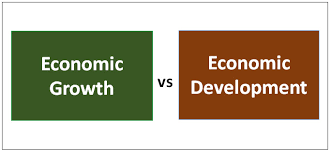Economic Growth and Economic Development are closely related concepts, but they differ in terms of their objectives, focus, and outcomes. Economic growth is one of the important components of economic development, but it is not the only one. Economic development aims to achieve long-term, sustainable improvement in the quality of life of the population, while economic growth is focused on increasing the size and output of the economy.

Table of Contents
Economic Growth
Economic growth refers to an increase in a country’s real Gross Domestic Product (GDP) or the value of goods and services produced within the country’s borders over a specified period. It is an important measure of a country’s economic performance and is often used as an indicator of its overall economic health.
Economic growth is typically measured in terms of percentage changes in real GDP over a specified period, such as a year or a quarter. Real GDP is adjusted for inflation, which means that changes in nominal GDP (which reflects the current prices of goods and services) are converted to changes in real GDP (which reflects constant prices over time) in order to provide a more accurate measure of economic growth.
Economic growth can be driven by various factors such as increased investment, technological advancements, population growth, and increased productivity. When an economy experiences economic growth, it generally leads to increased employment opportunities, higher standards of living, and improved infrastructure.
However, economic growth can also have negative consequences, such as increased inequality and environmental degradation. It is important for policymakers to balance the benefits of economic growth with its potential costs and to implement policies that promote sustainable and inclusive growth.
Economic Development
Economic development refers to the sustained, long-term growth and improvement of a country’s economy, aimed at improving the living standards of its citizens. Economic development typically involves a range of policies and strategies that aim to promote economic growth, increase productivity, create jobs, and reduce poverty.
These policies and strategies may include investing in infrastructure such as roads, bridges, and airports, promoting education and training programs to improve the skills of the workforce, supporting the development of new industries and businesses, and creating an environment that is favorable to entrepreneurship and innovation.
Overall, economic development is a complex process that involves a variety of economic, social, and political factors, and requires a long-term vision and commitment from government leaders, private sector actors, and other stakeholders.
Differences
| Economic Growth | Economic Development |
|---|---|
| Refers to the increase in a country’s GDP (Gross Domestic Product), i.e. the total value of goods and services produced in a given period. | Refers to the long-term process of improving the economic, social, and political well-being of a country’s citizens. |
| Measures the quantitative increase in economic activity and the size of the economy. | Focuses on the qualitative improvement in the standard of living and the quality of life of the population. |
| Can occur without significant improvements in living standards or reduction in poverty. | Aims to reduce poverty, inequality, and promote equitable distribution of wealth and resources. |
| Can be achieved through increased productivity, investment, technological advancements, and other factors that increase output. | Requires investments in education, healthcare, infrastructure, and other social programs that address the basic needs of the population. |
| Does not necessarily imply an improvement in income distribution or reduction in poverty rates. | Involves a range of policies and strategies that aim to improve the quality of life, such as reducing income inequality, improving access to education and healthcare, and promoting gender equality. |
| Focuses on short-term results and improving economic indicators such as GDP, inflation, and unemployment. | Focuses on long-term sustainable development that balances economic growth with environmental protection, social equity, and cultural preservation. |
Important Links